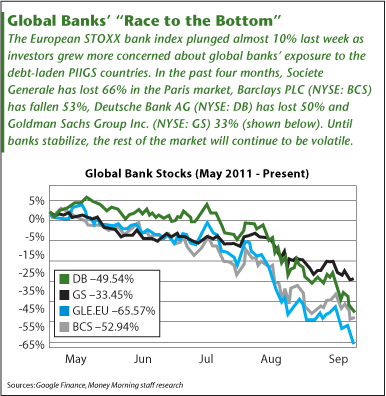The extremely volatile markets of late stem in part from news suggesting Greece's debt issues have made a default imminent - creating a global black hole that's sucking in a growing number of other economies with it.
Default fears intensified last Friday when European finance ministers announced they would delay a decision on whether or not Greece was eligible for its sixth tranche of bailout funds. Greece was scheduled to get the next $11 billion (8 billion euros) installment of its $152.6 billion (110 billion euros) aid package by the end of September, but now must wait at least until October.
European Union (EU) and International Monetary Fund (IMF) inspectors met with Greek Finance Minister Evangelos Venizelos last night to evaluate the country's progress with austerity measures. Greece agreed to reduce its deficit to 7.5% of gross domestic product (GDP) this year, and below 3% by 2014 in order to receive bailouts from the IMF and other euro nations.
But investors are afraid the country will run out of cash before a bailout decision is reached.
Greece may not be going down to a Trojan-level defeat in the next few days, or even weeks, but there is little doubt that the country cannot afford to remain harnessed to the euro. It faces almost certain default at this point, sad to say, which means that some big banks, shareholders and bondholders are going to suffer.
Perhaps those Eurozone critics who said that a currency union not backed by taxation or bond-issuing authority was a bad idea should have been heeded. Then countries like Greece would not have been encouraged into a currency union that's an ill-suited match for its unique economy, history and ambition.
Now the critics are being proven largely right, unfortunately.
The most dangerous thing is new evidence that the debt crisis continues to spread.
Looks like France is headed down the same path as Italy and Spain. According to a Bloomberg News story last week, France may need new austerity measures to avoid a bond sell-off and credit rating downgrade.
It seems that Nicolas Sarkozy is the new Silvio Berlusconi.
Greece's Debt Issues Now a Global Infection
Bank stocks keep tumbling as investors flee from the financial sector, fearing banks' exposure to Greek debt. The European STOXX bank index plunged 10% last week and the German stock market index, called the DAX, fell 7%.
As the accompanying chart illustrates, in the past four months Societe Generale SA (PINK ADR: SCGLY) has lost 66% in the Paris market, Barclays PLC (NYSE ADR: BCS) has fallen 53%, Deutsche Bank AG (NYSE: DB) has lost 50% and Goldman Sachs Group Inc. (NYSE: GS) 33%.
The decline of global bank stocks in the United States, Europe, even Japan, is indicative of growing unease. You don't have strong stock market rebounds while bank stocks are plunging. It doesn't happen that way. Just as in March 2009, they need to stabilize first, showing selling is exhausted.
Why are banks suffering so much?
Even if gross domestic product (GDP) growth were to end up at +2% annualized in the United States over the next year, avoiding recession, that implies employment growth of only around 75,000 per month. With more people entering the labor market, this implies an unemployment rate drifting up to 9.5% early next year, and puts the chances of recession at a touch over 50%.

The fundamentals are just as cold underneath as they look on the surface. The Organization for Economic Cooperation and Development (OECD) lowered its fourth-quarter forecast to 0.4% growth quarter-over-quarter for the United States, 0.0% for Japan and -1.4% for Germany.
Even U.S. President Barack Obama last week said that the economy had stalled, a stunning admission for a U.S. leader.
All the close-to-the-ground data is confirming this view.
Bond prices, which love misery, rise when investors sniff out a weakening economy. That sends bond yields down, and they sank as low as 1.92% this week, a 60-year low.
Meanwhile the Korean stock market, known as the KOSPI, which has been a great indicator of future U.S. earnings growth, fell 2.9% last week, and copper sank 12 cents.
The reason all of this is so pernicious is that countries are trying to reduce their budget deficits at the same time their economies are contracting, a credit crunch is emerging and social pressures are building (i.e. anti-austerity riots). These are not environments in which businesses and consumers go out and spend a lot.
ISI Group economists have called on the European Central Bank (ECB) to get out in front of the crisis by cutting rates by 100 basis points, or a full percentage point, and also launch a 500-billion-euro quantitative easing program. Liquidity may not really be the problem, but this would show leadership, push down the value of the overwrought euro (which helps exporters) and possibly help set a bottom for equity prices.
I rather doubt this will happen, as the Europeans have shown a stunning capacity for remaining in denial until their backs are against the wall and the wall is crumbling.
Expect the effects of Greece's debt issues to linger on the global economy for quite a while.
News and Related Story Links:
- Money Morning:
The Next Banking Crisis Starts Here - Money Morning:
The Future of the European Union May Be Decided in Less than a Week - Bloomberg News:
Greece Under Scrutiny for Next Aid Payment - Bloomberg News:
French Banks Slide as Greek Holdings Might Prompt Moody's to Cut Ratings


